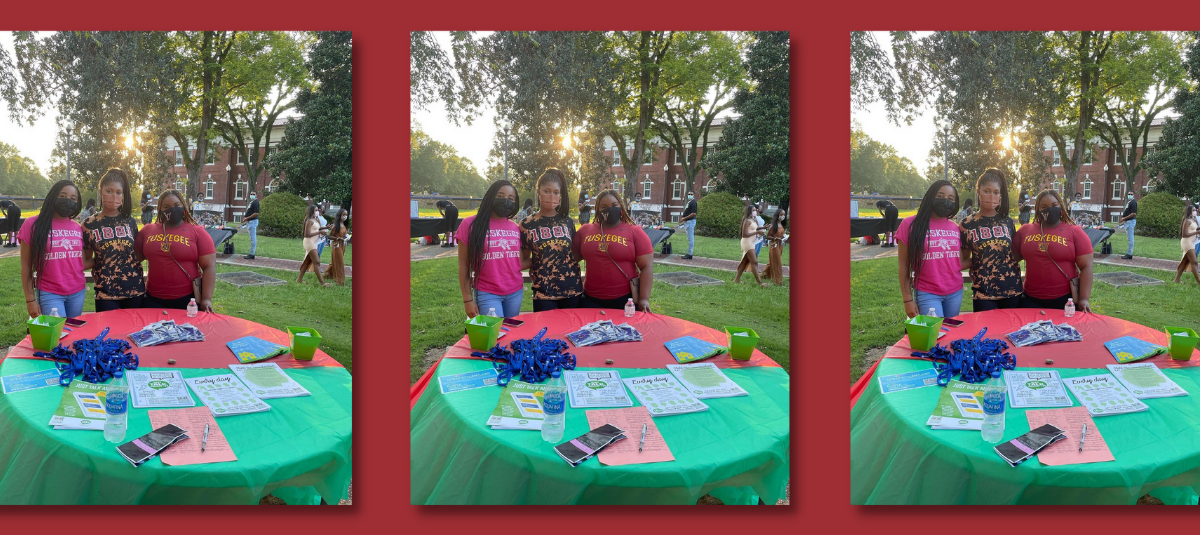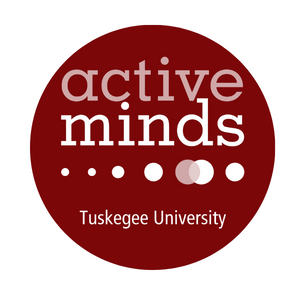Content Warning: This piece contains mentions of suicide.
In honor of Martin Luther King Jr. Day on Jan. 17, we share this message from Tuskegee University’s Active Minds chapter, a historically Black university, to both celebrate and honor the work and legacy of Dr. Martin Luther King, Jr., as well as shed light on the mental health advocacy being done on their campus.
Adrianne Brown, Ph.D. Candidate, Integrative Biosciences (IBS) Ph.D. Program, at Tuskegee University and founding member of Active Minds at Tuskegee University. Adrianne is from New Haven, CT.
Montessa Mitchell, Ph.D. Candidate, Integrative Biosciences (IBS) Ph.D. Program at Tuskegee University and founding member of Active Minds at Tuskegee University. Montessa is from Ormond Beach, FL.
Terrance Platt, Ph.D. student, Integrative Biosciences (IBS) Ph.D. Program at Tuskegee University and founding member of Active Minds at Tuskegee University. Terrance is from Selma, AL.
Dr. Deloris Alexander, Professor and Tuskegee University, advisor for AM@ TU, and the Director of the Integrative Biosciences Ph.D. Program.
Why did you become involved in the Tuskegee University chapter of Active Minds?
Dr. Deloris Alexander: I became involved in mental health advocacy when one of my students, that I thought was “fine,” shared with me that they had attempted suicide. I was stunned. Of all of the students I encountered, I never would’ve thought that this student would be struggling with suicidal ideation. I was especially struck by the fact that the attempt had happened months before and I had not noticed anything. The student had been walking around in pain and I hadn’t noticed. The next day, I opened up a conversation about mental health during one of my graduate classes and the room became silent, then filled with sobs as students shared that they were dealing with stress, anxiety, and in general, their mental health. It turned out that more than 40% of the students present that day were struggling with mental health challenges and, apparently, no one had ever allowed them to share how they felt. They were relieved to know that faculty cared and would listen and support them if they would only talk with us. The students next created a Safe Space workshop in which they shared, with the support of healthcare professionals, some of the common struggles they had. Out of this came our petition to have an Active Minds chapter at Tuskegee University. I agreed to be one of the advisors for TU’s chapter and, while the students did most of the work, faculty and staff members changed our posture to that which was supportive for students to talk about mental health. AM@TU students opened up conversations about mental health at national meetings and the university approved mental health days each semester to ensure that mental health was a priority on our campus. In 2021, AM@TU even got an award from the Alabama Department of Public Health to discuss and plan activities to improve mental health resources at our campus.
Adrianne: I saw that there was a need for mental health advocacy for African Americans. At the graduate level, students are constantly dealing with real-life issues: bereavement, loss, grief, financial stresses, anxiety, and nobody knows how to discuss this. We were wearing our mental health issues on our sleeves. Active Minds helped us to communicate what we were going through to people who could help us, and so our peers could know that they were not alone. We didn’t need to try to go through this by ourselves. There was a need to remove the stigma associated with mental health and to create safe spaces where we could talk about mental health without being judged. This was especially important for international students, who are often not used to having places to discuss mental health.
Montessa: I became involved with Active Minds because I didn’t want anyone to ever feel alone, or like they had to be dishonest about how they are feeling. We’re slowly but surely dismantling the stigma against mental issues, and fostering awareness about mental health on campus.
What have been some of your favorite experiences with Active Minds?
Adrianne: During the pandemic, we put forth efforts to maintain our presence virtually by hosting a session called “Journaling Through It” where participants had the opportunity to write out their feelings for forty-five minutes as a group. After the forty-five minutes were up, we were able to express to one another how the journaling session made us feel. During our “Mind, Body & Soul” series, we also had the opportunity to invite NASM-certified trainer and nutritionist Charli Harris to conduct a 30-minute workout session followed by a panel session. Clinical Psychologist Dr. Chanda Reynold, founder of Minds of the Culture, was also a guest speaker who talked with us about acquiring tools to achieve wholeness.
Montessa: I have had too many experiences to recount! My favorite, however, is our Mental Health Day that we have hosted three times on Tuskegee’s campus. We host a “Chalk-It-Out” event where students and faculty are encouraged to write positive notes for others to see and hopefully brighten their day. Each year the event gets bigger and better, culminating recently in a performance by the TU Crimson Pipers, and the distribution of face masks commemorating the event. By far my favorite memory!
Terrance: During midterm and final exam weeks each semester, we make it a point to consistently aid with the assembly and disbursement of student care packages throughout our campus. These packages include snacks, toiletries, and positive notes/messages and affirmations to students to assist them with stress management. We also partner with our campus’s student health center each year for the campus-wide health fair, during which time we highlight the importance of our campus organizations in bringing awareness about mental health and mental illness and we use the venue as an opportunity to continue to promote our presence for campus students. Last spring, on our campus, (with the help of the Tuskegee University Administration), Active Minds at TU successfully rolled out the ‘You Good?’ mental health t-shirt campaign. The t-shirts asked one simple question…..You Good? We felt that by asking this simple question (a question we ask our peers on a daily basis), we could create a comfortable, safe space for students to talk about their current mental health with their peers. The students wore the school colors-based shirt on Mental Health Awareness Day. This campaign was very well received by students and faculty alike as it also assisted with comradery and displaying school spirit!
What are some challenges you’ve faced and feedback you would give?
Terrance: Active Minds at TU continues to remain steadfast in tackling the many challenges faced by students and their mental health. We’re continuing to find new, innovative platforms to make our presence known as a campus-wide, student-led organization and increase our membership. Our membership continues to increase each year.
Montessa: Receiving consistent support and donations to this student-led and faculty-supported chapter has been a struggle until recent years. We pray that the support we have recently been given will continue, allowing us to continue to provide awesome events to break down the stigma and build up support!
Final Thoughts?
Adrianne: All Active Minds chapters need to reach out to each other. We are now living in a virtual world so why not reach out to have more frequent interactions with each other, bounce ideas off of each other. Everyone, at different periods during their lifetimes, deals with mental health. We could learn from each other. Dr. Martin Luther King Jr. was all about making sure that African-Americans had the same opportunities as other Americans. This includes mental health. Why not have predominantly white institutions work with HBCUs and other MSIs to talk about health disparities related to mental health? We could discuss our individual challenges and look for areas of common ground. All-in-all, my experiences with Active Minds have been memorable and the knowledge I’ve gained from being a member will last a lifetime.
Montessa: Active Minds is not only wonderful, it is necessary. Just knowing that you’re not alone, and not the only one to feel that way, helps students suffering from homesickness compounded with depression. It has helped me feel more at home by creating a family that I feel I can be honest with, and support in their honesty too. If you have a chapter near you, join. It can’t hurt. It can only help.
Terrance: Active Minds has been a breath of fresh air and welcomed by the student body. Students are excited to have a platform to talk about mental health and mental illness with their peers. It is certainly needed at minority-serving institutions, especially in the face of social issues like racial profiling, implicit bias, policing policies, etc. I am hoping AM continues to be a positive influence on college campuses.




